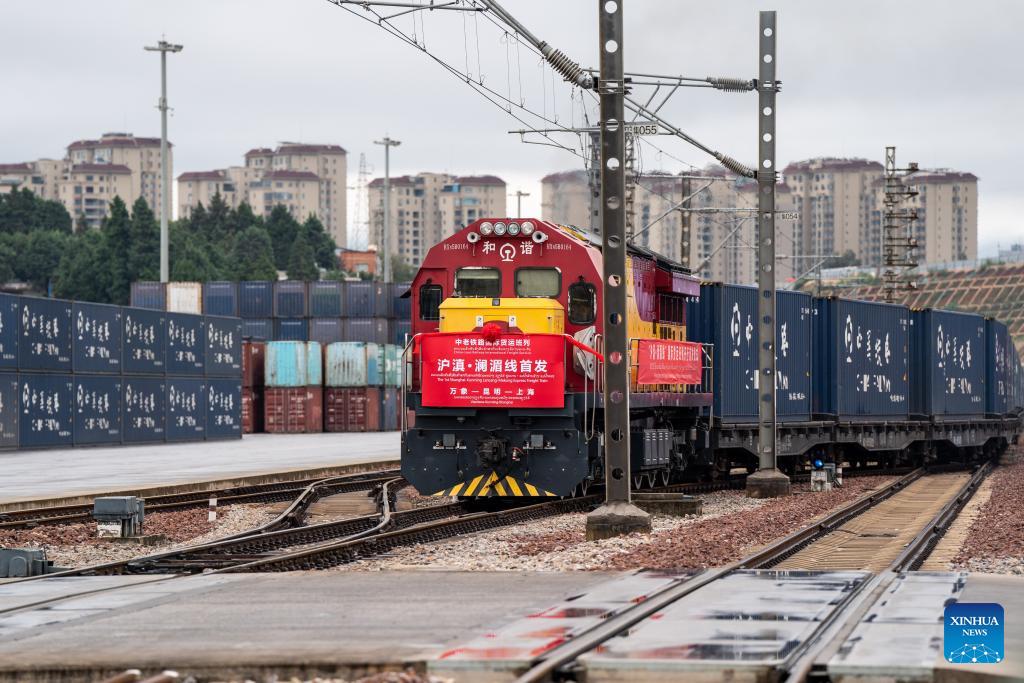BRI benefits the world by enhancing economic integration
- By Tom Fowdy
 0 Comment(s)
0 Comment(s) Print
Print E-mail China.org.cn, October 16, 2023
E-mail China.org.cn, October 16, 2023

The 1st freight train of Shanghai-Kunming Lancang-Mekong Express departs from Wangjiaying West Station in Kunming, southwest China's Yunnan province, Oct. 8, 2023. This marked the official launch of the Shanghai-Kunming Lancang-Mekong Express freight train service, which runs on the China-Laos Railway and the Shanghai-Kunming Railway to connect the Laotian capital of Vientiane and east China's Shanghai. [Photo/Xinhua]
Recently, China released a new white paper titled "The Belt and Road Initiative: A Key Pillar of the Global Community of Shared Future." The paper marks 10 years since the country proposed the Belt and Road Initiative (BRI) and the concept of a global community of shared future in 2013. It also heralds the forthcoming third Belt and Road Forum for International Cooperation (BRF), which dignitaries from across the globe will attend. According to Xinhua, the BRI represents "a Chinese solution to global development issues." Its goals include advancing modernization in tandem with participating countries, invigorating economic globalization to be more dynamic, inclusive, and sustainable, and ensuring that the benefits of this initiative are shared more equitably by people worldwide, constituting a new paradigm for international cooperation.
China views the BRI as a multilateral process aimed at achieving common development goals with other countries. Its fundamental objective is to enhance economic integration, with a strong emphasis on benefiting the Global South. The initiative strives to redress global disparities in development and wealth through large-scale investments in infrastructure, mainly in the developing world. Such efforts foster closer ties among nations to address common challenges. As stated in the white paper: "The BRI targets development not only for China but for the world at large. Economic globalization remains an irreversible trend. It is unthinkable for countries to return to a state of seclusion or isolation. However, economic globalization must undergo adjustments in both form and substance. It should be made more open, inclusive, balanced, and beneficial to all."
In doing so, the BRI aims to enhance cooperation on universal challenges, spanning from environmental to security concerns. The white paper underscores the growing complexity of the global political arena, where certain countries have embraced unilateralism, protectionism, and hegemonism, hampering economic globalization and threatening a global economic recession. These countries, who have been the primary benefactors of globalization for centuries, aim to forcibly divide the global economy to sustain their existing privileges, thus maintaining hegemonic power over other states, especially in the Global South, subsequently keeping them down.
This is why, even though these countries often make many unsubstantiated promises to the Global South, we still encounter rhetoric like "decoupling" and "de-risking." Such terms, under the guise of "national security," advocate for the preservation of existing inequalities.
However, China is not utilizing the BRI to gain advantages over other countries. Instead, it aims for mutual development, fostering a more prosperous global community. As noted in the paper: "It advocates win-win cooperation in pursuit of the greater good and shared interests. It emphasizes that all countries are equal participants, contributors and beneficiaries, and encourages economic integration, interconnected development, and the sharing of achievements."
Therefore, contrary to misleading Western reporting, the BRI is not a solo endeavor by China. It's a collective effort involving all stakeholders, aimed at shared development. This has already transformed continents, yet these achievements often receive minimal recognition and are overshadowed by negative portrayals. For example, in Africa, railways like the Mombasa-Nairobi Railway and the Addis Ababa-Djibouti Railway are now operational, serving as crucial drivers of development not just in East Africa, but across the entire continent. Similarly, the annual throughput of bulk cargo at Hambantota Port in Sri Lanka has increased to 1.21 million tonnes.
In addition, the China-Europe Railway Express now connects over 200 cities in 25 European countries, encompassing 86 routes passing through the main regions of the Eurasian hinterland at a speed of 120 kilometers per hour. Its logistics and distribution network covers the entire Eurasian continent. The achievements of the BRI are evident globally, providing nations with new infrastructure, and, in turn, new avenues to realize their potential and spur further development. This isn't about one country benefiting at the expense of others, as is often alleged, but rather represents a win-win outcome.
Thus, the Belt and Road Initiative is by no means done and will continue to serve as a crucial platform in driving globalization. It embodies the aspiration of countries in the Global South to realize their development goals and overcome historical disparities in economic privilege.
Tom Fowdy is a British political and international relations analyst and a graduate of Durham and Oxford universities. For more information please visit:
http://m.formacion-profesional-a-distancia.com/opinion/TomFowdy.htm
Opinion articles reflect the views of their authors, not necessarily those of China.org.cn.





